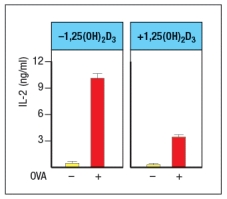The vitamin D3 metabolite 1,25(OH) 2D3 binds to the vitamin D receptor (VDR) . This complex then functions as a transcriptional regulator. The activation of VDR following treatment of cells with 1,25(OH) 2D3 has been found to modulate the activity of antigen-presenting dendritic cells. In one study, dendritic cells were isolated from wild-type mice and activated in vitro by stimulation with LPS plus IFN- in the presence or absence of 1,25(OH) 2D3 for 24 hours. These activated dendritic cells were then pulsed with a peptide from the chicken ovalbumin protein (OVA) that binds to MHC class II and is recognized by OT-II CD4 T cells. The peptide-pulsed dendritic cells and T cells were incubated together for 3 days, and then IL-2 levels in the supernatants were measured, as shown in Figure . 
Based on these data, dendritic cells activated in the presence of 1,25(OH) 2D3 are likely to show:
A) Reduced MHC class II and reduced B7 expression compared to controls
B) Enhanced expression of IL-12 compared to controls
C) Reduced expression of IL-6 and TNF- compared to controls
D) Increased expression of MHC class I and class II expression compared to controls
E) Reduced expression of proteins involved in antigen presentation compared to controls
Correct Answer:
Verified
Q1: In the first few days following organ
Q2: Cyclosporin A and rapamycin are each used
Q3: Immune responses to tumors have been studied
Q4: Mycophenolate mofetil is a cytotoxic drug that
Q6: A recent strategy showing some promise for
Q7: Immunotoxin therapy as an anticancer treatment is
Q8: Corticosteroids are anti-inflammatory drugs that are used
Q9: Immunotherapies aimed at promoting anti-tumor immune responses
Q10: Abatacept is a biologic drug that is
Q11: Natalizumab is a humanized monoclonal antibody
Unlock this Answer For Free Now!
View this answer and more for free by performing one of the following actions

Scan the QR code to install the App and get 2 free unlocks

Unlock quizzes for free by uploading documents